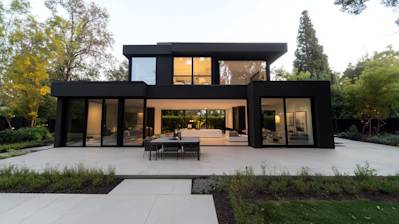Two of the most critical roles in the construction industry are those of the architect and the engineer. These professionals play substantial roles in bringing buildings to life. If you're looking into a career in these fields or planning a construction project, understanding the key differences between an architect and an engineer is essential. This article delves into the primary distinctions between the architect vs. engineer careers, touching on their roles, jobs, and educational requirements.
Architect Vs. Engineer: A General Overview
At first glance, an architect and an engineer seem alike. Both have substantial influence in designing and building structures. However, their responsibilities, focus, and approach to structures differ significantly.
What Does an Architect Do?
Architects design the overall aesthetics and functionality of a building, focusing on how it looks and feels. They're known for adding creative touches to create visually appealing spaces that meet the client's requirements. Architects also consider natural light sources, views, and other landscape elements in their designs to enhance the overall ambiance and improve functionality.
The Role of Engineers
Engineers, on the other hand, concentrate on the structural elements of construction. They transform architects' concepts into feasible projects whilst ensuring they follow building regulations, material strength, and safety standards. Engineers mainly focus on functionality, durability, and safety more than aesthetics, verifying that the building will stand strong and serve its purpose effectively.
Education: Architect Vs. Engineer
The education pathways for architects and engineers are distinct, reflecting their characteristically different roles in the construction industry.
Architectural Education
Aspiring architects usually enroll in a five-year Bachelor of Architecture program. Afterwards, they must complete an internship of typically three years under a licensed architect before taking the Architect Registration Examination. Passing this exam is crucial to obtaining licensure and practicing independently as an architect.
Engineering Education
Engineering programs usually last four years, culminating in a Bachelor of Science degree. After graduation, aspiring engineers must pass the Fundamentals of Engineering (FE) exam. They will then typically work under a Professional Engineer for about four years before taking the Principles and Practice of Engineering Exam. Upon passing this exam, they can become a fully licensed Professional Engineer.
Key Differences Between Architect and Engineer
From the above overview, several key differences emerge between an architect and an engineer. These lie in their roles, approach to building, and aesthetic versus practical considerations.
Focus
The major difference between an architect vs. engineer lies in the scope of their work. While architects consider aesthetics and functionality in their designs, engineers focus on the technical aspects of construction to achieve structural integrity, safety, and function.
Design vs. Implementation
Architects produce the initial blueprints of a building project, dealing primarily with space planning and aesthetics. On the other hand, engineers turn these visual designs into practical and executable plans considering the technical aspects. They ensure the structure can withstand various forces and loads.
Building and Construction Laws
While both architects and engineers need to know building and construction laws, engineers need more in-depth knowledge of these guidelines and rules. They assure that the structure meets all necessary standards and building codes for safety and structural integrity.
Architect Vs. Engineer
The roles of the architect and engineer are complementary, combining aesthetic visualization and technical realization to bring a building structure to life. While their roles often overlap, the differences in focus, design input, and construction oversight are fundamental in their work relationship. These realizations should offer enlightening insights into the architect vs. engineer discussion providing a deeper understanding of the construction industry's core roles.
Regardless of whether a student chooses to become an architect or an engineer, both professions offer rewarding career paths. Industry professionals, home builders, and potential clients also stand to benefit from a clearer understanding of these roles. Remember, successful construction projects often result from the combined expertise of both architects and engineers.
FAQs on Architect vs Engineer: Unveiling the Key Differences and Expertise
Here, we provide you a useful guide regarding the fundamental variations between architects and engineers. The FAQ covers a wide range of queries related to these two eminent professions and elucidates their roles, expertise, and collaborative importance.
Who is an Architect?
An architect is an expert tasked with creating and refining architectural designs. They play a significant part in visualizing and sketching the structure's concept and look, considering its functionality, aesthetics, and integration within the environment.
Who is an Engineer?
An engineer, on the other hand, brings an architect's blueprint to life. They employ their specialized technical knowledge to translate the design into a feasible, safe, and sound structure. The engineer ensures all aspects of construction, such as materials, physical forces, and legalities, have been addressed.
What is the Main Difference Between an Architect and an Engineer?
Both architects and engineers are critical in creating buildings, but their areas of focus vary. Essentially, architects work closely on the design and conceptual aspects, while engineers handle the technical and mechanical components. However, this difference can vary depending on their areas of specialty.
Can an Architect Become an Engineer, or Vice Versa?
Yes, with supplementary education and training, an architect could shift into engineering, and an engineer could venture into architecture. Each would require further studies and passing additional licensure examinations.
Are their Responsibilities Overlapping?
Yes, architects and engineers often collaborate together and their roles can overlap to some extent. For example, both professionals need a strong understanding of structures. However, while an engineer is more concerned with ensuring the structure's safety and efficiency, the architect integrates these elements into a holistic design that also considers aesthetics and functionality.
Who makes more Money, Architects or Engineers?
The income of architects and engineers can vary largely based on their experience, speciality, geographic location and the size and scope of the projects they are working on. According to the Bureau of Labor Statistics in the U.S, as of 2020, the median annual wage for civil engineers is slightly higher than the median wage for architects.
How Do Architects and Engineers Collaborate?
An architect might devise an initial design, but an engineer will work to implement the technical aspects of that design. During the process, the architect and engineer will need to frequently communicate and work together to ensure the final building will be both beautiful and structurally sound.
Which is Harder, Architecture or Engineering?
This can depend on individual talents and interests. Typically, architecture courses focus more on visual design and the artistry behind building design, while engineering courses focus more on the mathematical and technical elements of creating a durable and safe structure. Both fields have their unique challenges and demands.
Hopefully, this architect vs engineer FAQ guide has helped answer some of your questions. Both these experts are crucial in the construction process, and working together ensures a project's prosperity from conceptualization to its completion.
Summary
When it comes to the creative process we often have to get down to the nitty-gritty of architect vs engineer. At the end of the day, architects and engineers need each other to complete comprehensive, sturdy, and visually appealing structures. While architects are the ones designing and planning attractive, functional spaces, engineers are the ones making sure those designs can stand up and be functional in the real world.
Architects and engineers often work hand in hand on construction projects. Both are essential in the construction process. An architect's perspective is more artistic, focusing on aesthetics and usability, while engineers tend to focus on how things work and how to make them structurally sound. The architect vs engineer debate is less about who is more important and more about recognizing the valuable skills each contributes to any building project.
Simply put, the primary goal of an architect is to satisfy the client's needs with a design that is both visually pleasing and comfortable to the occupants. The engineer, on the other hand, concerns themselves with the practicalities, working out technical issues to ensure the foundation, structures, and systems are safe and reliable. So when it comes to architect vs engineer, it's less about rivalry and more about partnership. Both professionals bring unique skills and perspectives to the table, ensuring a balance between creative design and functional solidity.
About HouseIdea
Welcome to HouseIdea! We are a vibrant, innovative company based in the beautiful city of Sacramento, CA. We started with a simple goal in mind - to revolutionize the way you think about home improvement. Specializing in transforming residential spaces, we take pride in offering top quality services and creative home solutions. Whether it's a simple touch-up or a full-blown renovation, HouseIdea is dedicated to providing an exceptional customer experience with passion, professionalism, and a ton of creativity. Join us and let's create a home filled with love, comfort, and transformation!
Tags: construction industry, architectural design, structural engineering,



















